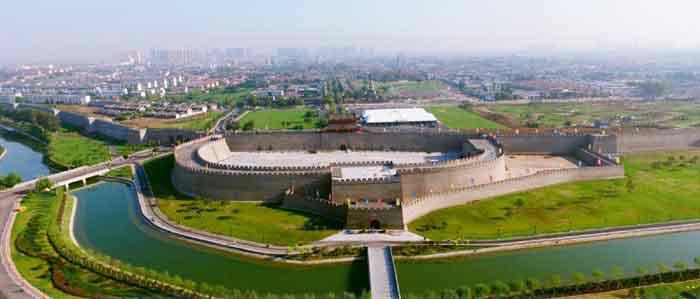Xi Jinping in Zhengding:Innovating Economic Development
Sitting 240 kilometers south of Beijing, Zhengding County in Hebei Province boasts rich cultural and historical heritage. From 1982 to 1985, Xi Jinping successively served as deputy secretary and secretary of CPC Zhengding County Committee.
“Ensuring Enough Food to Eat Is an Urgent Matter for Zhengding”
After he arrived at Zhengding, Xi made door-to-door visits to every household in his jurisdiction. After the visits, he found that although Zhengding was well-known for its high yield, 400,000 locals had to turn over 38 million kilograms of grain to the country every year, leaving many in the area with insufficient food on table. Moreover, due to outdated philosophies, Zhengding was still trapped in single mode of production, pursuing high yields of grain crops instead of higher-earning crops like cotton, oil plants and fruits. Therefore, local farmers werent left with enough food to eat after they handed in their quota to the government.
In the latter half of 1981, the gross output value of Zhengdings industry and agriculture remained at 206.73 million yuan (now US$31.13 million), with per capita annual income at 148 yuan(now US$22.3). “Ensuring enough food to eat is an urgent matter for Zhengding,” said Xi. He declared that the high grain quota led to the countys imbalanced agricultural structure, which had to be adjusted. Xi and Lu Yulan, then deputy secretary of the CPC Zhengding County Committee, went to Beijing to report Zhengdings real situation and difficulties. In early 1982, Chinas State Council sent related authorities to investigate, who concurred with Xi and Lus reports. The government reduced Zhengdings grain quota by 14 million kilograms, which relieved the food shortage problem plaguing the county.
After stabilizing their source of food, Zhengding people began looking for a better standard of living. Led by Xi, the county Party committee and government decided to try a contractual household output-related responsibility system in Lishuangdians commune, which was poor and far from the county seat. As a result, the same year, the value of agricultural production in Lishuangdian doubled, with annual per capita income exceeding 400 yuan (now US$60).
In January 1983, Zhengding formally approved the contractual household output-related responsibility system, proposing that land be controlled by households through lease rights for at least five years. And communes could decide on their own management methods. Consequently, Zhengding became the first place in Hebei to adopt the system, which laid a foundation for its economic lift-off.endprint
“Sound Environment Draws Talented People”
“High-caliber people are key to economic growth,” said Xi. “Exaltation of the virtuous is of strategic importance. Without high-caliber people, locals cannot become rich, nor the county strong. ”
At Xis suggestion, in 1982, the Zhengding government conducted three censuses to register intellectuals and technicians in all fields working in the county and made a roster. The countys 2,300 graduates of colleges and technical secondary schools were sorted according to their specialties and experience. Zhengding then had its first list of personnel. In November of the same year, Zhengding issued a regulation to improve intellectuals working and living conditions, encouraging the group to play a more important role in social development.
Additionally, Xi wrote more than 100 letters to experts and scholars nationwide to invite them to join the Zhengding advisory group. Fifty-three experts accepted the invitation, including mathematician Hua Luogeng, economist Yu Guangyuan, ophthalmologist Zhang Xiaolou and Zou Renjun, then president of the Academy of Sciences of Hebei Province. The group introduced modern science and information to the county and helped it grow faster. Yu Guangyuan lectured in Zhengding many times, guided its rural work and pushed the establishment of a rural research institution in Yongan Commune. Zou Renjun brought a batch of chemical projects to Zhengding. Since 1983, while spreading knowledge about disease prevention, Zhang Xiaolou had checked the eyes of 30,112 locals and performed 2,139 operations to improve or recover sight.
A native of Wuxi, Jiangsu Province, Qiu Binchang excelled at managing businesses. When Xi inspected Wuxi, he recruited Qiu and persuaded him to manage a Zhengding factory that was teetering on the verge of bankruptcy. The day after he took the position, Qiu sold all the surplus goods. In less than a year, production value doubled. Qiu worked in Zhengding for a dozen years until he retired. “I left my hometown and abandoned my former career just to follow a decisive and open-minded leader and reach for success,”said Qiu. “I did it.”
“Education Is the Foundation of a Wealthy Country”
In 1982, when Xi had just taken office in Zhengding, he launched a campaign to check the countys school buildings. It turned out that classrooms with a total area of 3,590 square meters in over 200 village-level primary schools were in bad shape. More than 10,000 school kids lacked desks and 40,000 pupils had to carry chairs to school themselves.endprint

In October 1983, Xi made it clear that the countys education needed reform but could not reform randomly. According to this principle, the county issued documents like Advice on Rural Educational Reform, allowing those teachers who were originally paid by the community to be paid by the government instead. The county also paid delayed salaries to teachers, which actually inspired local teachers enthusiasm for the job. The employment mode based on performance and contracts replaced traditional lifetime appointment. Of 2,985 full-time teachers in the county, 2,833 passed qualification tests. Teachers became greatly motivated and gained a greater sense of responsibility.
In 1984, Zhengding collected 1.87 million yuan to renovate 1,020 classrooms and buy 3,000 sets of desks and chairs. A total of 16 villages built schools, and many illegally occupied playgrounds were returned to schools.
Xi spent over 1,000 days and nights in Zhengding and contributed greatly to the countys development. “Zhengding is where I started my political career and is my second hometown,” he said.endprint
- China Pictorial的其它文章
- Xi Jinpingin Fujian:Great Care and Pragmatic Reform for the People
- Xi Jinpingin Zhejiang:Taking the Lead through Solid Work
- Xi Jinpingin Shanghai:Targeting Long-term Development and Defining Direction
- Feng Cuiling:A Breath of Fresh Air
- Su Wenzhu: Reading Yesterday Today
- Yu Liufen: Her People’s Leader

